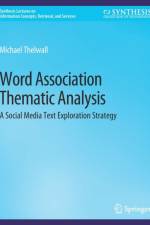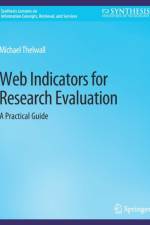av Michael Thelwall
351
Webometrics is concerned with measuring aspects of the web: web sites, web pages, parts of web pages, words in web pages, hyperlinks, web search engine results. The importance of the web itself as a communication medium and for hosting an increasingly wide array of documents, from journal articles to holiday brochures, needs no introduction. Given this huge and easily accessible source of information, there are limitless possibilities for measuring or counting on a huge scale (e.g., the number of web sites, the number of web pages, the number of blogs) or on a smaller scale (e.g., the number of web sites in Ireland, the number of web pages in the CNN web site, the number of blogs mentioning Barack Obama before the 2008 presidential campaign). This book argues that it can be useful for social scientists to measure aspects of the web and explains how this can be achieved on both a small and large scale. The book is intended for social scientists with research topics that are wholly or partly online (e.g., social networks, news, political communication) and social scientists with offline research topics with an online reflection, even if this is not a core component (e.g., diaspora communities, consumer culture, linguistic change). The book is also intended for library and information science students in the belief that the knowledge and techniques described will be useful for them to guide and aid other social scientists in their research. In addition, the techniques and issues are all directly relevant to library and information science research problems. Table of Contents: Introduction / Web Impact Assessment / Link Analysis / Blog Searching / Automatic Search Engine Searches: LexiURL Searcher / Web Crawling: SocSciBot / Search Engines and Data Reliability / Tracking User Actions Online / Advaned Techniques / Summary and Future Directions



